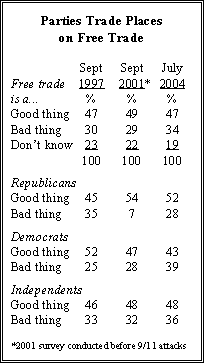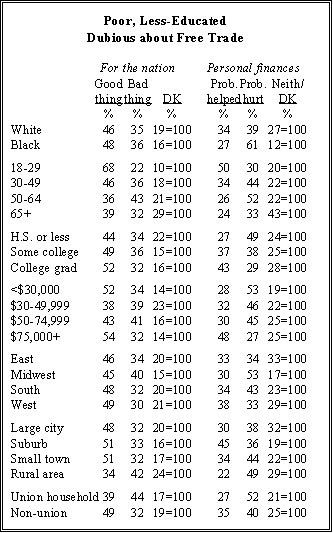
Middle East Policies
A growing number of Americans believe the United States is not doing enough to bring about a peace settlement between the Israelis and the Palestinians. Current opinion is now nearly evenly divided, with 46% saying the U.S. is doing all it can, and 42% saying it is not. In April 2002 a majority (53%) felt America was making its best efforts to bring peace to the region, while only a third (34%) said it was not. Democrats have become more skeptical of U.S. efforts to forge peace, increasing the partisan gap on this issue.
In addition, a declining percentage of the public believes that American policies in the region are fair to both sides. The percent saying U.S. policies are fair has dropped from 47% in May 2003 to 35% today. Nearly a third (32%) say American policies favor Israel too much, up slightly from 27% just over a year ago. Just 5% think the policies are overly favorable toward the Palestinians, down slightly from 8%.
Republicans are nearly twice as likely as Democrats to say America’s policies in the Middle East treat both sides fairly (49% vs. 26%). Four-in-ten Democrats say U.S. policies favor Israel; just 22% of Republicans agree. Independents fall squarely between partisans on this issue (34% say policies are fair, 34% say they favor Israel).
Despite these shifting views of American policies in the region, there is little change in public sympathies in the conflict between Israel and the Palestinians. A plurality of Americans (40%) continue to say they sympathize with Israel, while just 13% side with the Palestinians. These attitudes have remained very consistent in polls dating back a decade and longer.
A majority of Republicans (57%) say they side with Israel, while only a third of Democrats and independents agree. While both groups are somewhat more supportive than Republicans are of the Palestinians, Democrats and independents are also less inclined to take sides. Fully 28% of both Democrats and independents say they sympathize with both or neither side of the conflict.

China
American opinions of China have remained stable in the last two years, and most see America’s relationship with China neither improving nor deteriorating. A small minority (14%) of Americans still see China as an adversary; four-in-ten consider China to be a serious problem but not an adversary; and 36% think China is not much of a problem. More Republicans than Democrats continue to see China as an adversary, a difference between the parties that has persisted since 1997. Today, 17% of Republicans and 9% of Democrats see China as an adversary; in 1997, 19% of Republicans and 12% of Democrats held that view. Those who believe the U.S. made the right decision to go to war in Iraq are more likely to see China as an adversary than those who don’t approve of the decision to use force.
Views of the Sino-American relationship have gone almost unchanged over the past two years. A majority (58%) continues to say that relations between the two countries are staying the same, while 18% say relations are improving and only 13% believe things are getting worse.

Mixed Feelings about Free Trade
Americans have mixed views about the impact of free trade agreements like NAFTA and the WTO. While a plurality (47%) says these agreements are generally good for the U.S. overall, 34% say they are a bad thing. When it comes to the impact on their own financial situation, more say free trade has probably hurt (41%) rather than helped (34%).
These divisions are not new public evaluations of the impact of free trade agreements on the nation have held steady since the question was first asked in 1997. But there has been a notable switch in the political dimensions of the issue.
Today, Republicans feel more favorably toward free trade than do Democrats. By nearly two-to-one (52% to 28%) Republicans say free trade agreements are good for the nation, while Democrats are divided almost evenly (43% good thing, 39% bad). Seven years ago, when Bill Clinton was in office and supportive of free trade, these figures were reversed, with most Democrats viewing free trade positively (52% good thing, 25% bad) and Republicans more divided (45% to 35%).
However, the issue of free trade does not appear to be having a significant impact on the 2004 election. Just 2% of Americans cite trade and jobs moving overseas as the most important problems facing the nation.

Income Matters
Wealthier people tend to have a favorable impression of free trade, both in terms of its impact on themselves and the nation. A majority of those earning less than $30,000 annually agree that free trade may be good for the nation, but most in this income category feel it has either definitely or probably hurt their personal financial situation.
Younger people also take a decidedly favorable view of free trade agreements, when compared with older Americans. Fully 68% of those under age thirty say free trade is good for the country, and half say it has definitely or probably helped their own financial situation. By comparison, people age 50-64 are divided over whether it is good for the country (36% say yes, 43% no) and most say they have been hurt by NAFTA and other free trade agreements.


